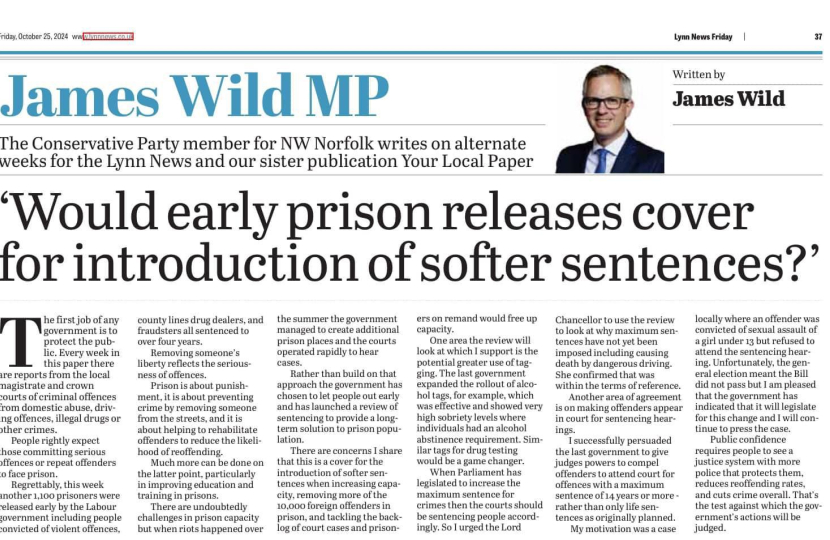
The first job of any government is to protect the public. Every week in this paper there are reports from the local magistrate and crown courts of criminal offences from domestic abuse, driving offences, illegal drugs, or other crimes. People rightly expect those committing serious offences or repeat offenders to face prison.
Regrettably, this week another 1,100 prisoners were released early by the Labour government including people convicted of violent offences, county lines drug dealers, and fraudsters all sentenced for over 4 years.
Removing someone’s liberty reflects the seriousness of offences. Prison is about punishment, it is about preventing crime by removing someone from the streets, and it is about helping to rehabilitate offenders to reduce the likelihood of reoffending. Much more can be done on the latter point particularly in improving education and training in prisons.
There are undoubtedly challenges in prison capacity but when riots happened over the summer the government managed to create additional prison places and the courts operated rapidly to hear cases. Rather than build on that approach the government has chosen to let people out early and has launched a review of sentencing to provide a long-term solution to prison population.
There are concerns I share that this is a cover for the introduction of softer sentences when increasing capacity, removing more of the 10,000 foreign offenders in prison, and tackling the backlog of court cases and prisoners on remand would free up capacity.
One area the review will look at which I support is the potential greater use of tagging. The last government expanded the roll out of alcohol tags, for example, which was effective and showed very high sobriety levels where individuals had an alcohol abstinence requirement. Similar tags for drug testing would be a game changer.
When Parliament has legislated to increase the maximum sentence for crimes then the courts should be sentencing people accordingly. So I urged the Lord Chancellor to use the review to look at why maximum sentences have not yet been imposed including causing death by dangerous driving. She confirmed that was within the terms of reference.
Another area of agreement is on making offenders appear in court for sentencing hearings. I successfully persuaded the last government to give judges powers to compel offenders to attend court for offences with a maximum sentence of 14 years or more - rather than only life sentences as originally planned.
My motivation was a case locally where an offender was convicted of sexual assault of a girl under 13 but refused to attend the sentencing hearing. Unfortunately, the general election meant the Bill did not pass but I am pleased that the government has indicated that it will legislate for this change and I will continue to press the case.
Public confidence requires people to see a justice system with more police that protects them, reduces reoffending rates, and cuts crime overall. That’s the test against which the government’s actions will be judged.


